

Pega Platform and Bonita are competitors in the business process management sector. Pega has an upper hand due to its comprehensive suite that caters well to large enterprises, offering capabilities that Bonita finds challenging to match in terms of advanced features.
Features: Pega Platform supports case management, integration services, and offers a unified architecture, ideal for complex workflows. It is enterprise-friendly and adept at rapid application development. Bonita provides strong integration capabilities with diverse system connectors and is flexible in process modeling and custom form development, making it user-friendly and adaptable.
Room for Improvement: Pega users cite time-consuming upgrades and expensive licensing, with a need for lighter versions for non-developers. It also needs better support for dynamic processes and enhanced integration capabilities. Bonita's challenges include inadequate documentation, a non-intuitive UI, and requests for a more robust feature set alongside improved mobile capabilities and an enhanced interface for advanced process handling.
Ease of Deployment and Customer Service: Pega provides on-premises and various cloud deployment options, suitable for both large enterprises and flexible environments, with generally solid support that may require escalation for complex issues. Bonita focuses on on-premises deployment, offering community and enterprise support with positive user feedback, but more suited to smaller or customized deployments.
Pricing and ROI: Pega's pricing varies with user and case volume, seen as high for smaller companies but promising significant ROI for large entities with complex needs. Bonita offers flexible pricing, including free options and annual licenses not based on user count, making it accessible for mid-sized enterprises and offering a reasonable return on investment with simpler requirements.
| Product | Market Share (%) |
|---|---|
| Pega Platform | 3.9% |
| Bonita | 2.2% |
| Other | 93.9% |


| Company Size | Count |
|---|---|
| Small Business | 14 |
| Midsize Enterprise | 4 |
| Large Enterprise | 11 |
| Company Size | Count |
|---|---|
| Small Business | 9 |
| Midsize Enterprise | 15 |
| Large Enterprise | 69 |
Pega Platform provides flexible business process management with a focus on rapid application development and automation through a low-code approach, enhancing efficiency across sectors.
Pega Platform is renowned for its ability to streamline operations with robust automation features, including robotic process automation and decision-making capabilities. Its intuitive interface and workflow management contribute to a reputation for enhancing business processes. Although users face challenges with integration limitations and high licensing costs, they benefit from rapid deployment and efficient process adaptations. The unified architecture reduces complexity, while case management and integration services support digital transformations in sectors such as banking, insurance, and healthcare.
What are the key features of Pega Platform?
What benefits and ROI should users expect?
In industries like insurance, banking, healthcare, and government, Pega Platform is implemented to automate diverse workflows, supporting initiatives from claims processing to customer onboarding. Enterprises use Pega for case management and digital transformations, valuing its out-of-the-box integrations and real-time reporting capabilities to boost operational automation and enhance customer experiences.
We monitor all Business Process Management (BPM) reviews to prevent fraudulent reviews and keep review quality high. We do not post reviews by company employees or direct competitors. We validate each review for authenticity via cross-reference with LinkedIn, and personal follow-up with the reviewer when necessary.